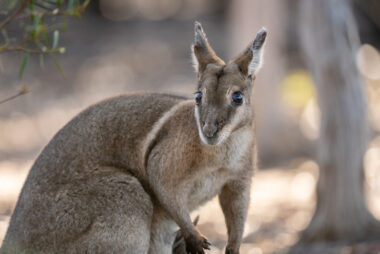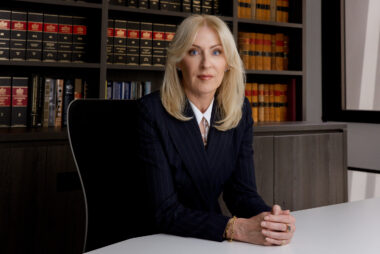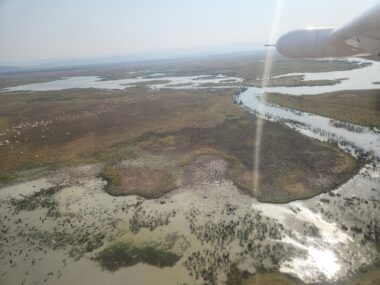Following extraordinary on-Country hearings in Zenadth Kes (Torres Strait) in June 2023, and climate expert evidence given in Naarm (Melbourne) in November, the legal team representing Torres Strait Traditional Owners Uncle Paul Kabai and Uncle Pabai Pabai will make their closing arguments in the Uncles’ last bid to save their homelands, communities and culture from climate disaster.
Climate change is already causing sea level rise and more frequent and intense storms in the Torres Strait, with local communities at risk of becoming Australia’s first climate change refugees.
Uncle Paul and Uncle Pabai aren’t alone in their fears for their lives and homes - communities around Australia are still reeling from the devastating consequence of fires, floods, overwhelming heatwaves and smoke inhalation. Members of these communities are coming together to throw their support behind this case by sharing their stories and attending the Cairns hearings to stand with Uncle Paul and Uncle Pabai to fight for climate justice.
If successful, this case has the potential to force the Federal Government to rapidly reduce emissions. This could supercharge the transition to a clean economy and could stop new fossil fuel projects; improving climate outcomes for all Australians.
What will happen at the hearings?
The hearings will commence on Monday 29 April with an Opening Ceremony to celebrate the vibrant and ancient Torres Strait Islander culture, dance and storytelling at risk from climate harm. The renowned Muyngu Koekaper Dance Team from Saibai will travel to Cairns to perform a new dance developed in response to the rising tide and effects of climate change.
In Court, the Uncles’ legal team will make their closing arguments; explaining why the Commonwealth owes Torres Strait Islanders a duty of care and how the Commonwealth has breached its duty by failing to protect Torres Strait communities from climate harm. This will tie together the climate science and the evidence given by the Uncles and their communities during the on-Country hearings.
The Commonwealth’s legal team will also take the Court through their arguments, defending its current climate policies and denying that it owes Torres Strait Islanders a duty of care to protect them from climate harm. The judge will likely reserve his decision at the end of the hearing. A decision might be handed down later this year.
Further cultural events will take place during the week, with an Island Night Community Celebration on Wednesday 1 May featuring updates on the hearings in language (Kalaw Lagaw Ya) plus food, culture and a full set of dances from the Muyngu Koekaper Dance Team and a performance by Christine Anu.
What is the backstory to this case?
Faced with rising sea levels and distressing inaction on climate change, in October 2021 Uncle Pabai and Uncle Paul filed the Australian Climate Case against the Australian Government for failing to prevent climate change. The homes of people in the Torres Strait could disappear beneath the rising seas, making them Australia’s first climate change refugees. For Zenadth Kes people, the impacts of climate change won’t only force them from their island homes, but sever their connection to thousands of years of culture and deep spiritual connection passed down generation by generation, connection to land, sea, winds and sky and community.
Uncle Pabai and Uncle Paul are seeking orders from the court that require the Federal Government to take steps to prevent this harm to their communities, including cutting greenhouse gas emissions in line with the best available science. The Australian Government currently has a 2050 ‘net zero’ emissions target, which experts say will not be enough to prevent disaster in the Torres Strait. In fact, leading climate scientists on the Climate Targets Panel calculate that Australia’s greenhouse emissions need to be reduced by 74% by 2030 (from 2005 levels) and to net zero by 2035 to keep global heating to below 1.5°C and avert the destruction of Torres Strait Islander communities.
Uncle Paul Kabai says: “It has been a big journey since our case started and now we are at the final hearings. Our message to the Australian Government is that we can’t wait any more years for climate action to stop our islands from going underwater.”
“Our community is here in Cairns standing together and using our voice to ask the Government to protect our homelands, our communities and our culture from climate change for the future generations to come.”
“We are fighting to do everything we can to maintain our connection to thousands of years of culture and deep spiritual connection, passed down through our ancestors.”
Uncle Pabai Pabai says: “We have taken the Australian Government to court so they will listen to us, because we are the people being most affected by climate change.”
“We are witnessing climate change, like erosion and inundation, rapidly getting worse before our eyes. If the Government keeps failing us, we will be forced to leave our homelands, to lose our identity, our culture – everything.
“The message from my community to the Australian Government and everyone listening is that the time for politics must stop, you have a duty of care to take action to urgently protect us from climate harm.”
Torres Strait Elder Dr Aunty McRose Elu says: “Our community brought this case because we are fighting for our very existence and we are not being listened to. We want the Government to act with integrity and hear our voices.”
“The Government has known that they are putting our people and the world in danger for decades but they won’t listen. We know they can be doing so much more to keep us all safe. Our only chance of survival is to act very quickly to put us on the right path and keep the warming below 1.5 degrees. But the scientists say that their commitment to reduce the gases [GHG emissions] by 43 % by 2030 is not enough to save our homelands from climate change.”
“We are standing together strong with climate impacted communities from all around Australia. If we walk together in one spirit, one mind, one strength and wisdom, we will find a way forward together. I’m confident that is how we will get there.”
Uncle Pabai, Uncle Paul and their communities are represented by Phi Finney McDonald. The Australian Climate Case is supported by Grata Fund and the Urgenda Foundation, and is backed by a strong international precedent. In 2015, the Urgenda Foundation and 886 people took the Dutch government to court for not doing enough to prevent climate change and won. The courts ordered the Dutch government to take immediate steps to cut greenhouse gas emissions and thanks to this groundbreaking legal action, the Netherlands now has some of the strongest climate policies in the world. This case triggered a groundswell of litigation internationally, with more than 80 similar cases filed around the world resulting in real-world emissions reductions in Germany, the Netherlands, Switzerland and elsewhere; meaning that the pressure is on the Australian government to act now.
Principal Lawyer, Phi Finney McDonald’s Brett Spiegel says: “Phi Finney McDonald are honoured to represent Uncle Pabai, Uncle Paul and Torres Strait Islanders in their fight for climate justice to protect their home, culture and identity. We look forward to this opportunity to make their closing submissions to the Court.”
“We begin these final hearings with a growing sense of urgency, knowing the time to act to save Uncle Pabai and Uncle Paul’s homeland is diminishing.”
Grata Fund’s Executive Director, Isabelle Reinecke, says: “The tide is turning. Since this case began we have seen a wave of international legal decisions finding that climate action is a matter of law. Again and again, courts are finding there is a legal limit to how much harm Governments can knowingly cause to their citizens.”
“The Government cannot continue to knowingly ignore what they already know, that 2/3 of Boigu island will be under water in 30 years due to sea level rise from polluting climate emissions.”
“A win could benefit us all – from communities in the Torres Strait Islands, to bushfire and flood affected communities across Australia, to Canberra where our elected representatives would be forced to urgently decide how to rapidly cut emissions in line with the science to limit global warming to 1.5 degrees, just as happened after similar cases won in the Netherlands and Belgium.”
A decision on this case could potentially be handed down later this year.
Key Facts:
|
|
Contact details:
For more information or to request interviews, contact Terri King at Pitch
on [email protected] or 0488 036 740.
Download images, video footage and audio grabs here.
Available for interview:
-
Uncle Pabai Pabai, Uncle Paul Kabai
-
Aunty McRose Elu and other climate leaders from the Torres Strait
-
Isabelle Reinecke, Grata Fund
-
Brett Spiegel, PFM
-
Jo Dodds, NSW bushfire survivor, Noelle Maxwell, Northern Rivers flood survivor & Jade Vivienne, Kangaroo Island bushfire survivor
-
Performer Christine Anu
- Jen Robinson, International Human Rights Barrister and Counsel for Vanuatu in the current International Court of Justice Advisory Opinion, Grata Fund board member
For more information on the Australian Climate Case, visit the website: australianclimatecase.org.au
View the case timeline or read the Federal Court’s simplified summary of the case.



